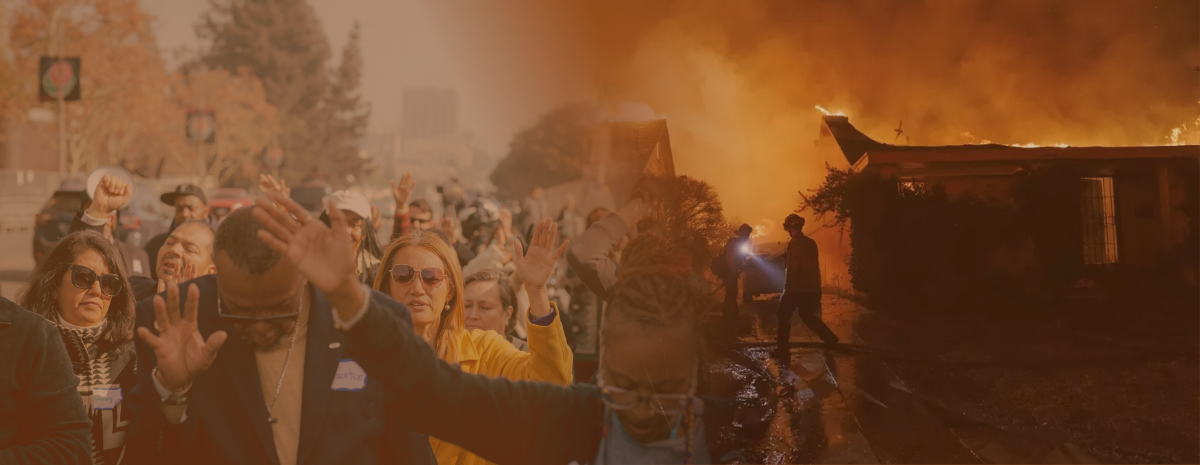
Eaton Fire Resource Hub
In the wake of the Eaton Canyon fires devastating communities in the foothills of the San Gabriel Mountains, the Clergy Community Coalition is leading efforts to develop a coordinated short and long-term response by churches in the Greater Pasadena Area, which consists of Pasadena, Altadena and Sierra Madre.
We are in the early stages of development, but anticipate that mid-term and long-term housing navigation and solutions will be a gap. From prayer, to relief, resettlement, and redevelopment, the local church is committed to walk with our neighbors in our community towards, recovery, healing and flourishing. Below, you’ll find essential resources to support pastors and leaders as they serve their congregations and communities.
Local Resources
For Pastors and Clergy
-
Assess the Needs: Survey your congregation (template here) and community to identify specific challenges and gaps in services.
Activate Crisis Teams: Delegate responsibilities to trusted leaders to oversee areas like counseling, food distribution, and communications. (partner with other churches if needed)
Host a Community Meeting: Provide a forum for sharing updates, praying together, and brainstorming ways to respond collectively.
Connect with Relief Organizations: Build relationships with local nonprofits, government agencies, and community leaders to streamline resources and assistance.
Pray Without Ceasing: Lead your church in continuous prayer for wisdom, provision, and healing for all affected.
-
1. Be Present
Show up for your congregation with empathy and consistency. Listen to their concerns and provide comfort through your presence and prayers.
2. Communicate Hope
Speak with care and encouragement. Validate emotions while pointing people to the promises of God.
3. Provide Practical Support
Help meet immediate needs like food, shelter, and supplies. Connect people with local resources and relief organizations.
4. Foster Prayer and Healing
Host prayer gatherings, encourage lament, and offer counseling or referrals for emotional and spiritual healing. A 17-minute trauma healing video is available here.
5. Equip Your Church
Train leaders and empower your congregation to care for one another. Build a culture of support and shared responsibility.
6. Care for Yourself
Take time to rest, reflect, and recharge. Seek support from fellow pastors and prioritize your own spiritual and emotional health.
-
1. Assess Needs
Identify ongoing challenges like housing, employment, and emotional support by collaborating with community leaders and organizations.
2. Develop Ministries
Create sustainable programs, such as housing navigation, job training, and counseling, tailored to long-term recovery.
3. Equip Volunteers
Train and rotate volunteers to serve effectively while preventing burnout.
4. Partner Strategically
Work with nonprofits, government agencies, and churches to share resources and expertise.
5. Foster Healing
Offer prayer gatherings, support groups, and teachings that encourage spiritual and emotional resilience.
6. Plan Financially
Set up a dedicated recovery fund, provide updates to donors, and host fundraisers to sustain efforts.
7. Revisit Plans
Regularly evaluate programs, gather feedback, and adjust initiatives to meet evolving needs.
-
Essential Information
-
Virtual Community Meeting (Jan.10 | 4PM)
Pasadena Water and Power Advisory
Issued a 'Do Not Drink' order for evacuated areas due to potential water contamination. Visit the Pasadena Water and Power website for updates and guidelines
-
California Office of Emergency Services (Cal OES)
Offers financial recovery programs, housing assistance, and guidance on rebuilding after disasters. Visit the Cal OESwebsite for more information.California Department of Social Services (CDSS)
Provides disaster services including housing assistance, food programs, and other support. Contact your local CDSS office or visit the CDSS Disaster Services webpage for assistance.California Department of Insurance
Assists with insurance claims related to wildfire damage. Contact their Consumer Hotline at 1-800-927-4357 or visit the Department of Insurance website for guidance.
-
Federal Emergency Management Agency (FEMA) Assistance
Provides financial aid for temporary housing, home repairs, and other disaster-related expenses. Apply online at DisasterAssistance.gov, via the FEMA App, or by calling 1-800-621-3362.U.S. Small Business Administration (SBA) Low-Interest Loans
Offers loans to homeowners, renters, and businesses for repairing or replacing damaged property. Visit the SBA DisasterLoan Assistance website for more information
